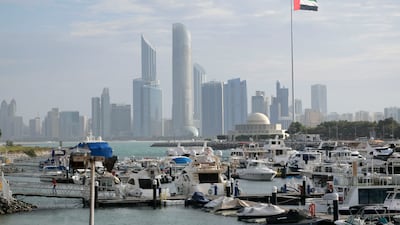The Middle East and North Africa financial action task force, MENAFATF, has upgraded three FATF recommendations ratings for the UAE for its efforts to combat money laundering and terrorism financing.
The body upgraded FATF recommendations 1, 19 and 29 to “compliant” or “largely compliant” in response to the steps taken by the Arab world’s second-largest economy, Executive Office for Anti-Money Laundering and Counter-Terrorism Financing said in a statement on Tuesday.
“The UAE is working diligently to implement effective measures that ensure that we are fully compliant with the FATF’s 40 recommendations,” said Hamid Al Zaabi, director general of the executive office.
The upgrading of the recommendations is a “welcome recognition of our progress”, he added.
The FATF recommendations are the technical and legal building blocks for an effective framework to combat money laundering, terrorist financing and proliferation financing.
MENAFATF, which was established in 2004 by 14 Mena governments, helps member countries combat financial crime through the implementation of the FATF’s 40 recommendations on combating money laundering and the financing of terrorism.
The rerating of recommendation 1 reflects the progress made in implementing a risk-based approach and the UAE’s ongoing work with the World Bank to complete its second National Risk Assessment.
The recommendation requires member countries to identify, assess, and understand their specific money laundering and terrorist financing risks and to take actions to mitigate them.
The FATF recommendation 19 requires financial institutions to apply enhanced due diligence to business relationships and transactions with people and financial institutions from countries specified by the FATF.
Recommendation 29 deals with operational capabilities and requires countries to establish an operationally independent financial intelligence unit that serves as a national centre for the receipt and analysis of suspicious transaction reports.
“We will continue our efforts to improve ratings for recommendations as part of a firm commitment to building an AML/CFT system that befits our vision of becoming a leading country in the fight against financial crime,” Mr Al Zaabi said.
The UAE has made progress in fighting money laundering and terrorist financing, after the FATF included it in its “grey list” – a list of jurisdictions that face increased monitoring – last year.
The Emirates issued fines of more than Dh115 million ($31.3 million) in the first quarter of the year to combat money laundering. This is a sharp increase from the Dh76 million issued for the same period last year, according to a report by state news agency Wam.
More than 160 fines were handed out to 76 entities in the first three months of 2023 for different violations. Confiscations also increased, with frozen assets surpassing Dh925 million during the November 2022 and February 2023 period, the report said.


